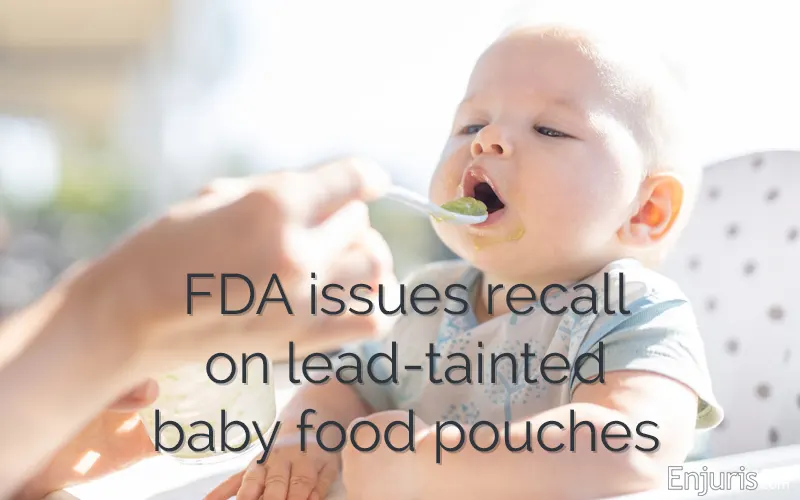
Many popular baby foods contain arsenic, lead, and other toxic metals, according to a congressional report released on February 4, 2021.
The report has understandably raised concerns among parents who want to know whether their children have been affected and whether they have legal recourse.
Let’s take a closer look.
The congressional report
On November 6, 2019, after receiving reports alleging that there were high levels of toxic metals in popular baby foods, the Subcommittee on Economic and Consumer Policy (“the Committee”) investigated the following baby food manufacturers:
- Nurture, Inc. (which sells baby food products under the name Happy Family Organics and HappyBABY)
- Beech-Nut Nutrition Company
- Hain Celestial Group, Inc. (which sells baby food products under the name Happy Family Organics and Earth’s Best Organic)
- Gerber
Three other manufacturers (Campbell Soup Company, Walmart Inc., and Sprout Foods) refused to cooperate with the investigation.
The lengthy investigation found alarming levels of arsenic, lead, and cadmium in all 4 of the baby food manufacturers’ products. What’s more, mercury was present in baby food products made by Beech-Nut Nutrition Company and Hain Celestial Group.
“The Subcommittee’s investigation revealed that manufacturers knowingly sell tainted baby food to unsuspecting parents, in spite of internal company test results showing high levels of toxic heavy metals, and without warning labels whatsoever,” said Chairman of the Committee Raja Krishnamoorthi.
Both the U.S. Food and Drug Administration (FDA) and the World Health Organization (WHO) have publicly declared inorganic arsenic, lead, cadmium, and mercury to be dangerous to human health, particularly children. Even low levels of exposure can cause serious and often irreversible damage to brain development.
Nevertheless, the FDA does not currently regulate heavy metals in baby foods, with the exception of arsenic (which is limited to 100-parts-per-billion).
The Committee’s report expresses hope that the FDA will begin strictly regulating the use of toxic metals in baby foods and, at the very least, require manufacturers to disclose the use of toxic metals on their food packaging in the future.
Baby food lawsuits
Baby food lawsuits generally fall under the category of defective product liability lawsuits. If a baby food product is considered “defective” and someone is harmed as a result, the manufacturer can be held liable.
The law recognizes 3 types of defects:
| Type | Definition | Example |
|---|---|---|
| Manufacturing defect | A defectively manufactured product is one that, although property designed, left the manufacturer in a condition other than intended. | A banana purée became tainted with mercury during the manufacturing process. As a result of the accidental contamination, the children who consumed the purée developed kidney disease. |
| Design defect | A product is defectively designed if it fails to perform as safely as a reasonable person would expect, even when used as intended. | Oatmeal designed for children contains 500 ppb of arsenic. Most children who consume the food become sick as a result of the high levels of arsenic. |
| Failure to warn | Manufacturers have a duty to warn users of the dangers that can be reasonably anticipated and that are inherent in their products. | A baby food item contains high levels of lead, but the packaging fails to warn consumers of the potential health risks. |
A defective product liability lawsuit can be brought under a theory of negligence or strict liability.
Negligence-based product liability
In a product liability case based on negligence, the plaintiff must prove that:
- The defendant owed the plaintiff a duty of reasonable care (manufacturers owe a duty of care to all potential users of their products),
- The defendant breached the duty of reasonable care, and
- The defendant’s breach was the cause of the plaintiff’s injuries.
Strict product liability
In a product liability case based on strict liability, the plaintiff must prove that:
- A product was sold in an “unreasonably dangerous” condition,
- The unreasonably dangerous condition existed at the time the product left the defendant’s control, and
- The dangerous condition was the cause of the plaintiff’s injuries.
Several class-action lawsuits have already been filed against the manufacturers named in the congressional report. These lawsuits seek to cover anyone who purchased the named baby foods in the United States over the last 5 years.
What should you do if you believe your child was impacted by a defective baby food product?
If you believe your child may have been negatively impacted by one of the baby foods listed in the congressional report, it’s a good idea to reach out to a product liability attorney in your area for a free initial consultation. The attorney will be able to help you decide whether you should file a separate lawsuit or whether you should join one of the class-action lawsuits that have already been filed.
Have you purchased any of the baby foods listed in the congressional report?
Share your thoughts below.
FDA Recalls Baby Applesauce Pouches
Baby applesauce pouches—a staple for lots of tiny palates—have been recalled because of high levels of lead in the cinnamon.


Janet tait says
My child ate the baby food and ended up with adhd.